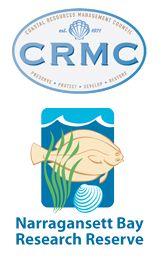
RI Coastal Resources Management Council
...to preserve, protect, develop, and restore coastal resources for all Rhode Islanders

...to preserve, protect, develop, and restore coastal resources for all Rhode Islanders
CRMC begins work on Quonnie salt marsh restoration
Update on salt marsh restoration at Narrow River (12/8/16)
Update on the Narrow River Marsh Restoration and Elevation project (10/7/16)
Narrow River Salt Pond Restoration Photos
Click here (PDF) to view the Rhode Island Coastal Wetlands Inventory Report completed by the Army Corps of Engineers through the Planning Assistance to States program. The purpose of this project was to develop an accurate wetland map for coastal Rhode Island, inventory those coastal wetlands and identify potential restoration sites based on aerial photographs and ground truthing of vegetative cover types. The project area includes coastal Rhode Island from the most western end of Westerly near the mouth of the Pawcatuck River, easterly to Point Judith, the coastal zone from Sakonnet Point easterly to the state line of Massachusetts, and Block Island.
In 1959, the U.S. Army Corps of Engineers filled eleven acres of saltmarsh in Allen's Cove and some mudflats on the south shore of the cove with dredged material from a nearby navigation project. This impacted the velocity and daily tidal exchange of bay water and ultimately resulted in the replacement of saltmarsh vegetation by the common reed (Phragmites australis) and an increase in erosion of the remaining marsh. This project proposes to restore the degraded coastal wetlands and habitat with a healthy saltmarsh ecosystem by re-grading some of the area to an elevation suitable to encourage and maintain the growth of saltmarsh vegetation and potentially restoring some of the open waters that existed prior to the filling, as well as addressing erosion by using excavated material from the fill area to widen and stabilize the eroding coastal shoreline.
Coastal Briefing (PDF)
Poster Presentation on the Geologic Change and Habitat Restoration of Allin's Cove (PDF)
Integrated Ecological Restoration Report/Environmental Assessments, Final Report (PDF)
Sedimentation basins, designed to trap sand as it surges through the three breachways, have not been adequately maintained since breachway construction. Shoaling has formed inside the breachways, with tidal sand deltas forming into the ponds themselves. The shifting sand has killed aquatic vegetation that once sustained fertile fish and shellfish breeding areas. The purpose of this Project was to assess the need for ecosystem habitat viability through sediment removal and replanting of eelgrass to promote the return of greater numbers of valued fish and shellfish than have been seen in recent years.
Coastal Briefing: The South Coast Habitat Restoration Project (PDF)
Brochure (PDF)
Final Feasibility Report and Environmental Assessment and Appendices I-IV (PDF)
Ninigret Pond Sedimentation Basin and Relief Channel Maintenance Project Poster (JPG)
For more information on eelgrass habitats, see the CRMC Submerged Aquatic Vegetation page.

The Rhode Island Coastal Resources Management Council is currently seeking pre-proposals for habitat restoration project funding through its R.I. Coastal and Estuarine Habitat Restoration Program and Trust Fund. Proposed projects should seek to restore or enhance ecological conditions that have been degraded by human impacts in coastal or estuarine habitats such as coastal wetlands, submerged aquatic vegetation beds, shellfish beds, vegetated coastal upland and anadromous fish runs. Priority will be placed on those projects that seek to enhance coastal habitats’ resiliency to frequent storm events and sea level rise; for example, projects that remove barriers to future wetland migration with sea level rise or that enhance shoreline vegetation where habitat is threatened by increased coastal erosion. Additionally, priority will be placed on communities that have historically received less investment in environmental restoration.
History: The Rhode Island General Assembly established the Coastal and Estuarine Habitat Restoration Program to facilitate design, planning, construction, and monitoring of coastal and estuarine restoration projects by providing grants and technical assistance. The program is administered by the CRMC with technical support from the R.I. Habitat Restoration Team. The Trust Fund allocates monies from fees collected under the Oil Spill Prevention and Response Act (OSPAR) to potential habitat restoration projects. The Habitat Fund Technical Advisory Committee, chaired by the Narragansett Bay National Estuarine Research Reserve and comprised of members from state, federal and non-profit organizations, recommends projects to the CRMC for funding.
Eligibility: Municipalities, committees, boards or commissions chartered by a municipality, nonprofit organizations, civic groups, educational institutions and state agencies are eligible to apply. Proposed projects must be located within Rhode Island. There is no specific match requirement for proposed projects; however, proposals that can demonstrate matching funds or in-kind services will have an advantage in the selection process. Applicants are therefore encouraged to detail all federal and non-federal resources contributing toward completion of the project, whether cash or in-kind.
Funding Levels: Funding for projects is from an annual account totaling $225,000. Individual project awards generally range from $5,000 to $50,000 per year. Longer-term projects may reapply for additional funds in subsequent years.
Deadline: Please use the document template linked below for your project pre-proposal. Pre-proposals are due by 4:00 p.m. on Friday, October 31st, 2025. Pre-proposals should be submitted to: Bruce Lofgren, AICP, RI Coastal Resources Management Council, Oliver Stedman Government Center, 4808 Tower Hill Road, Wakefield, RI 02879 and electronically in Word or PDF format to blofgren@crmc.ri.gov. For questions regarding the Fund or application requirements, please contact Bruce Lofgren at blofgren@crmc.ri.gov or 401-783-3370. Selected applicants will be invited by CRMC to submit full proposals.
Resources for Applicants
Planning Consistency:
Restoration Priorities:
Rhode Island Coastal Wetland Restoration Strategy (PDF)
State Habitat Restoration Strategy (PDF)
Additional Resources:
RI Critical Lands Project
RI Resource Protection Project
Previously Funded Projects: